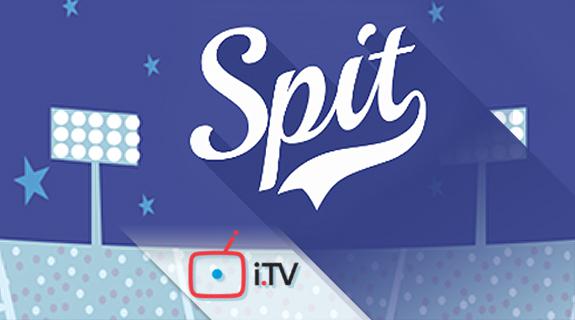When i.TV launched its extremely popular namesake TV guide app in 2008, the company observed something unexpected in how its users behaved.
“We found users were socializing through the app,” said Brad Pelo, CEO of i.TV. “Instead of just finding what shows to watch, they were chatting through the review feature and during the sporting events.”
Part trash talk, part Sunday morning quarterbacking, the social conversation was pervasive enough that Pelo and his team began developing a new offering. The goal was a mobile app that tapped into “the idea that people are smarter on the couch than on the field,” said Pelo.
The fruit of their labors appeared in the App Store in September: a predictive mobile sports game with a name as provocative as it is strangely apt: Spit.

The story behind the name, said Pelo, has more to do with spirited competition than saliva.
“We had a brainstorm session talking about what’s common to various sporting events,” he explained. “Someone said, ‘if you think about it, you could offer to have spitting contests with your friends.’ The name sounded very memorable and it’s a fun way to talk about the gamification of predictive live-sports viewing. It’s not about the spittle per se as about having a contest with your friends.”
On the surface, Spit, which basically involves guessing what the next play will be in a given game and then bragging to your friends about it, seems like a rather rudimentary offering for i.TV, a company whose mobile TV guide is the most downloaded app of its kind in the history of the App Store. And also a company who, in 2013, acquired GetGlue, morphing it into what is now called tvtag, a check-in app that lets the user socially “tag” show moments with comments, memes, emoticons and even doodles. And who also happens to be the developers behind Nintendo TVii, the video game behemoth’s built-in streaming television platform.
But with a predictive game like Spit, “there is something to the simplicity,” said Pelo, “and there is something highly social.” i.TV proved that early on when it used its TVii connection to debut the first version of Spit to a captive audience on Nintendo. Appearing during the NFL season, Spit’s initial version simply allowed users to predict whether the next play in their chosen game would be a run or a pass. With nothing more than that basic level of game play, the app managed to garner tens of thousands of users by the time the Super Bowl rolled around.
“We found it was super provocative to the players because they could not only vote on the outcome but they could participate in a chat session with other viewers,” said Pelo. “It was very sticky.”
Since then, Spit has evolved into an iOS app and expanded to offer predictive gaming for the NFL, NBA, MLB, college football and college basketball on ESPN and other major sports channels. But the ability to trash-talk your opponent seems to be the real draw, as evidenced by exclamations on Spit’s App Store page and website such as “…trash talk your friends and their lousy team,” “Chat, challenge, and mercilessly destroy your friends as you all watch the big game” and of course, “TAKE THE SPORTS THRONE THAT IS RIGHTFULLY YOURS!

Pelo said that the play-by-play live gaming element combined with the integrated competitive conversation enriches the experience of watching the game. “What we’ve found is that fans of Spit enjoyed the game broadcasts much more because it kept them engaged,” he said. “[It gave them] a heightened adrenaline experience and they came away much more fulfilled.
Naturally, this presents an opportunity for sports broadcasters, whose collaborative partnerships “are the DNA of our company,” said Pelo. At the time of this writing, i.TV had around 70 broadcast partnerships, with most of that revenue benefiting the much more established tvtag. But Spit’s value potential, said Pelo, has only begun to present itself.
“We drive viewership and engagement with the sports networks,” he explained. “If you’re going to play the game while watching television, that means you’re always in the second screen, which is not true of most TV viewers. Most do use a smart device, but just periodically. What is unique to Spit is, it is an always-on experience.
“Synchronized game play around the game you’re watching [offers] great opportunities for marketers and broadcasters,” he continued, “because they know this audience is always interested.”
Tags:













































__twocolumncontent.jpg)











